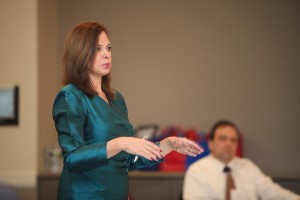
Back row, from left: Paula Dinneen, Luis Poza-Garcia, John Mazzarella, Gene Shwalb, Linda Sudlesky and Theresa Nelson-Miller.
Front row, from left: Rrezarta Hyseni, Melanie M, Jouliana Bosneva and Ellen Foust.
The Instructional Support Team at UMass Boston is a model instructional team in higher education. Instructional Support Team members partner with faculty to assist in designing college courses, whether online, hybrid, blended or face-to-face. The objective is to actively engage students and foster critical thinking and metacognition. Instructional designers help faculty by developing teaching methods that cultivate student engagement and peer instruction, creating student self- and peer-assessment strategies, helping to protect academic integrity, assisting faculty in flipping their classrooms and producing audio/visual projects. The Instructional Support Team also supports faculty in using various technologies and tools, including Blackboard Learn, Blackboard Collaborate, SafeAssign, Wikis, Blogs, iClicker, Respondus, Echo360, Google Apps, Adobe Presenter, Voicethread and iTunesU.
Most members of the team are graduates of the UMass Instructional Design Graduate Program. Gene Shwalb and Irene Yukhananov are Senior Instructional Designers on the Support Teem. Other IDers on the team are Ellen Foust, Paula Dinneen, Linda Sudlesky, John Mazzarella, and Rrezarta Hyseni. Luis Poza-Garcia, Mish McIntyre and Melanie M are active ID graduate students working with the team as Graduate Assistants. Other integral members of the team are Jouliana Bosneva and Theresa Nelson-Miller, both Instructional Designers that came to us from different universities.
“The moments I most enjoy in instructional design are when faculty come with a problem,” says Gene Shwalb, Interim Manager of Instructional Support and one of our Faculty in the Instructional Design Graduate Program. “I love when the faculty know what they want to do, but aren’t sure what the best instructional strategy or tool is to achieve the outcomes they want. It’s great to brainstorm with faculty and find the best fit to meet their needs.”








